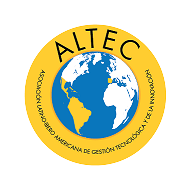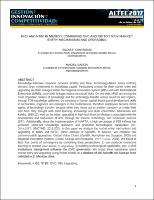| dc.contributor.author | Contreras, Óscar F. | |
| dc.contributor.author | García, Maciel | |
| dc.date.accessioned | 2021-05-28T21:59:01Z | |
| dc.date.available | 2021-05-28T21:59:01Z | |
| dc.identifier.uri | https://hdl.handle.net/20.500.13048/1520 | |
| dc.description.abstract | Knowledge-Intensive Business Services (KIBS) and New Technology-Based Firms (NTBF) demand large investments in knowledge capital. Particularly criticai for their market entry and upgrading are their linkages within the Regional Innovation System (RIS) and with Multinational Enterprises (MNE), since both linkages reduce structural lacks. On one side, MNF, are among the most important carriers of knowledge and for technology transfer across countries and regions, through FDI knowledge spillovers, by investing in human capital, training and development skills in technicians, engineers and managers in the multinational, therefore employees become direct agents of technology transfer, because when they move out to another company or create their own firm, they brought with them leaming, knowledge and skills (Blomstrôn, Globerman and Kokko, 1999:12). And on the other, upgrading in high-tech firms in Mexico is associated with the development and maturation of RIS, through the science, technology, and innovation policies (STI). Additionally, since the implementation of NAFTA, a high percentage of FDI inflows has produced importam knowledge spillovers and promoted technological capabilities (SE, 2016:1517; UNCTAD, 2015:202). In this paper we analyze the market entry mechanisms and upgrading of KIBS and NTBF, either Startups or Spinoffs, in Mexico. We combine two commensurable approaches: Global Value Chains (Gereffi, Humphrey and Sturgeon, 2005) and Regional Innovation Systems (Cooke, Uranga and Etxebarria, 1997; Cooke, 2001). We found at least four points of convergente by combining these perspectives: 1) user-producer interactive leaming to product innovation; 2) upgrading; 3) building technological capabilities, and; 4) RIS institutional arrangement influente the GVC governante. We tested three hypotheses about market entry and upgrading using Probit models on a database of 100 Spinoffs and Startups firms collected in 11 Mexican cities. | |
| dc.language.iso | eng | |
| dc.rights | info:eu-repo/semantics/openAccess | |
| dc.rights | Atribución-NoComercial-SinDerivadas 2.5 Perú | |
| dc.rights.uri | http://creativecommons.org/licenses/by-nc-nd/2.5/pe/ | |
| dc.subject | Knowledge-Intensive Business Services (KIBS) | |
| dc.subject | New Technology-Based Firms (NTBF) | |
| dc.subject | Global Value Chains (GVC) | |
| dc.subject | Regional Innovation System (RIS) | |
| dc.title | Kibs and NTBF in Mexico: combining GVC and RIS to study market entry mechanisms and upgrading | |
| dc.type | info:eu-repo/semantics/conferenceObject | |
| dc.relation.conferencedate | 16-18 de octubre, 2017 | |
| dc.relation.conferencename | XVII Congreso Latino-Iberoamericano de Gestión Tecnológica | |
| dc.relation.conferenceplace | Ciudad de México, México | |
| dc.contributor.corporatename | El Colegio de la Frontera Norte | |


